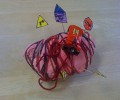Stop Yelling and Communicate
Besides unconditional love, communicating effectively is the most important thing you can give to your child. Here are our favorite tips:
Top Communication Tips
1. Be in close proximity. It may be easier to simply yell down the hallway that dinner is ready, but in the long run you will find yourself repeating yourself over and over again until you begin to feel ignored. Walking down the hallway and making eye contact to ensure that your message is received saves a lot of time and frustration.
2. When giving a directive, do not make it a question. You don’t want to imply there is room for discussion when there isn’t. This is a habit that develops overtime as a way to ensure your child is paying attention, but what it actually does is imply that there is room for discussion. “Come down for dinner, Okay?” A fairly predictable response from a child with ADHD would be “I’ll come down as soon as I finish this level on my video game.” As you walk out of the room, your child has already directed his attention back to the video game, feeling that they have been given permission to keep playing.
2. Create Cue Words. Assign one or two word phrases to cue important behaviors. For example, 5 minutes might mean shoes on, fill water bottle, grab backpack.
3. Keep in mind the Power of Three. The first time you say something your child registers that someone is speaking, the second time your child understands you are talking to them and the third time your child hears the message you are trying to convey. The goal of this tip is to understand what is happening in your child’s brain as you are communicating so that your own frustration level doesn’t rise and you don’t feel disrespected.
4. Consider the Moment. Gain control of your communication by understanding that your strategies may need to change, depending on the situation. Understand that your child may be feeling dejected after a long day at school where they struggled to stay in their seat and pay attention. They may have been redirected by their teacher 12 times and by the time they hear the frustration in your voice, they are ready to explode. On the flip side, you may be exhausted from a particularly stressful day so your patience is worn thin. Consider the moment and everyone’s emotions as you are giving a directive to your child. If your child hears positivity and affection in your voice, they are more likely to respond the same way. If they hear frustration, they may perceive it to be extreme anger because they have been compiling it with everyone else’s frustration towards them throughout the day.
5. Put all these tips together for effective, self esteem boosting communication. No one is perfect and this is not about parenting or communicating perfectly. It is about empowering yourself and your child to communicate effectively. See what happens when you walk down to where your child is to start to communicate, make eye contact, use a cue word, or use the Power of Three.
Most importantly, start listening deeply! Listen with all of your senses without saying a word and hear what your child is telling you through their body language and voice.
P.S. Click Here if you are looking for more ideas on parenting the anxious brain join our course that includes 4 Group Coaching Calls. Doors Close May 4th!
P.S.S. We know you may have questions so sign up here for a 15 minute call to get all of your questions answered.









